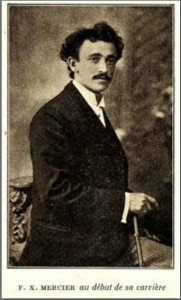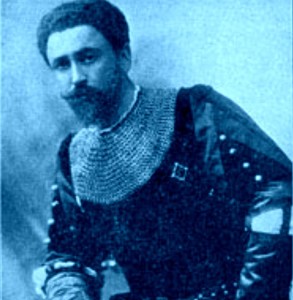Eigentlich bin ich ja nicht wirklich der ganz große Fan von Schellacks, die mir – nur mir natürlich! – zu dünn und oft plärrig aus dem Lautsprecher entgegenschallen und mich glauben machen sollen, dass dies die Stimmen der berühmten Sänger der Vergangenheit, der Urauffürungen von Verdi, Mascagni oder D´Albert sein sollen. Ich weiß, ich mache mir jetzt wirklich Feinde, und ich will wirklich nicht die rabiaten Sammler von Altertümern kränken, die jetzt die Stirn runzeln ob meiner Ignoranz. Ich höre diese fernen Aufnahmen nicht gerne, und egal wie wunderbar Caruso, Siems, Hempel oder Soot (ausgenommen z. B. Destinn) gesungen haben mögen – sie sind mir fern, zu fern für meine Beurteilung und vor allem für mein Vergnügen. Aber es gibt eben doch diese unerklärlichen kleinen chemisch-physiologischen Überraschungen, wenn ich plötzlich an eine Stimme gerate, die in meinem Herzen etwas anrührt, eine Empathie herstellt, die über den tiefen Zeitgraben, über alle Unbill von Kratzern und Trichter, Wachs und Walze hinweg plötzlich eine Verbindung schafft, die an heutiges Hörvermögen anknüpft, die mich innehalten lässt, die mir etwas sagt und mit mir kommuniziert.
Dies eben geschieht mir mit dem kanadischen Tenor François-Xavier Mercier, der 1932 mit 65 Jahren starb und der um 1900 herum zu den glanzvollen Tenören im französischen Fach gehörte. Ich hatte ihn einmal auf einer Anthologie kanadischer Stimmen gefunden, wo er mir auffiel und irgendwie im Gedächtnis blieb, und ich begegnete ihm erneut und nun nachdrücklich auf dem Blog greatestoperasingers des Armeniers Ashot Arakelyan, der sich auf historische Aufnahmen spezialisiert hat und diese in CD-Kompilationen auch verkauft (s. nachstehend). Das Netz bietet ja unendlich viele dieser interessanten websites, auf denen Sammler und Händler ihre Artikel ausstellen und auch verkaufen. Letzteres mag mancher vielleicht kritisch beurteilen, aber man muss ja auch nicht zugreifen, wenn man das nicht möchte. Bei den greatestoperasingers jedenfalls erwartet das suchende Auge eine Fülle an Namen und auch klingenden Beispielen, und schon beim Aufklicken ertönt ein ganz wunderbares Solo des Nadir aus den Pêcheurs de Perles in Russisch (Piotr Slovtsov), ah – welche Kultur, welcher Schmelz, welche verlorene Kunst. Da kann für mich nur Alain Vanzo mithalten. Als Hörprobe erlebt man dann einen Ausschnitt aus Raouls Arie aus den Huguénots mit Mercier. Eben! Im Folgenden also eine Vita Merciers und Details zu diesem spannenden Blog mit seinen vielen historischen Stimmen-de luxe. G. H.

François-Xavier Mercier/OBA
François-Xavier Mercier (Tenor) (Québec, Canada 1867 – Québec, Canada 1932). He sang in Quebec City from his early childhood, especially at the Church of the Congregation of Notre-Dame (now Jacques-Cartier). He performed as a soloist in the hall of the Académie commerciale and thus came to the notice of the school’s director, who accepted him as a non-paying student at the institution and in 1891 found a position for him as bookkeeping teacher at the Collège Mont-St-Louis, Montreal. Mercier lived 1892-4 in Toronto, where he studied elocution with J. H. Cameron and solfège with Adèle Lemaître. In Boston he performed the role of the Duke in Rigoletto at Castle Square but soon returned to Toronto to open a voice studio. With means of a subscription and the proceeds of some concerts given at Massey Hall, Mercier went to Paris and studied voice for five years with Jacques Bouhy and solfège and stage techniques with T. Valdejo. In January 1899 he was chosen from among 18 tenors to sing at the Opéra-Comique; he made his debut in Méhul’s Joseph. Le Gaulois commented: ‚Mercier’s tone was superb. A powerful voice, perfect diction, expressive features; he is actor and singer rolled into one.‘ Later he sang in Carmen, Mireille, and Manon. In 1901 Mercier performed in Faust, Les Huguenots, Carmen, Roméo et Juliette, and Le Roi d’Ys at Covent Garden, London, in casts which included Calvé, Journet, Melba, Plançon, Scotti, and Tamagno. He returned to Paris to learn the role of Arnold in Guillaume Tell, which he later sang in Bordeaux and in Rouen, where according to Le Nouvelliste, he received seven curtain calls for his performance of the aria ‚Asile héréditaire.‘ After singing in Faust, L’Africaine, Les Huguenots, Sigurd, and La Juive on tour in France, he visited Italy and Switzerland. He repeated his roles in Les Huguenots at The Hague and Guillaume Tell at Spa with Noté. In December 1906, while preparing for a season at the theatre in Lyons, he had to return to Quebec City because of his mother’s death. In 1907 he sang in Toronto and in Quebec City, and that November he left once again for Paris. Mercier spent the 1908-19099 season in Constantine (Algeria), where he triumphed in Les Hugénots, and then in Werther, Carmen, La Navarraise, I Pagliacci, Marie-Magdeleine, Sigurd, and Hérodiade. In Algiers and Oran, he sang Tell and La Juive. His next undertaking was to participate in 22 opera and oratorio concerts at Queen’s Hall, London, under Sir Henry Wood. After another tour of Franceand Algeria, he returned to Quebec City in August 1913 with his wife, the singer Isabelle de Besson (Mlle Jeynevald), whom he had met in Constantine and married in Lyons in 1909.
In 1914 Mercier founded the Institut d’art vocal. He taught there until his death. In 1931 he was named honorary president of the newly founded Association des chanteurs de Québec. He wrote a series of articles, ‚Classement et pose de la voix‘ which appeared in La Musique in 1919, and in 1923 he published Souvenirs de ma carrière artistique, reprinted under the title ‚Gerbe de souvenirs‘ in his study Technique de musique vocale (Quebec City 1928). He composed numerous songs, including ‚Ce que je chante‘ Opus 65, which was published in 1918, and ‚France et Canada‘ Opus 106, published in 1929. A number of his works are held at the ANQ in Quebec. greatestoperasingers
Auf der CD und als Hörprobe: Columbia, New York 1915 : Les Huguénots (Meyerbeer): L’entrée de Raoul E2376 45649; sowie Chanson de l’adieu (Tosti) E2377 45659 France E2380 45652; La Huronne E2377; Marie Magdeleine (Massenet): Heureux ceux qui vivront E2375; Mireille (Gounod): La foi de son flambeau divin with Isa Jeynevald E2375; Musette du XVIIe siècle E2378 45658; Ô Canada, mon pays, mes amours! E2378;Tosca (Puccini): Oh! des beautés régales,;; Zingarella E2380 45656 – CD contains 30 tracks and costs 30 $ + 5 $ for World wide shipping, including post and packing.
forgottenoperasingers@gmail.com Ashot Arakelyan, Armenia. Erevan, Street Tamanyan 2, Apartment 20, Postal code 0009, Tel: +37410 56 80 48, Payment methods accepted Bank Transfer Payment, Payments by mail and International Money Transfers Systems. 5$ for World wide shipping, including post and packing. GREATEST OPERA SINGERS is the most comprehensive site on greatest opera singers on the World Wide Web. It provides biographies, chronological Information, photos, labels and sound samples to over 900 singers. Payment methods accepted/ Bank Transfer Payment/ Payments by mail / International Money Transfers Systems
Das Foto oben zeigt Mercier als Vasco in der Africaine/greatestoperasingers/ OBA

